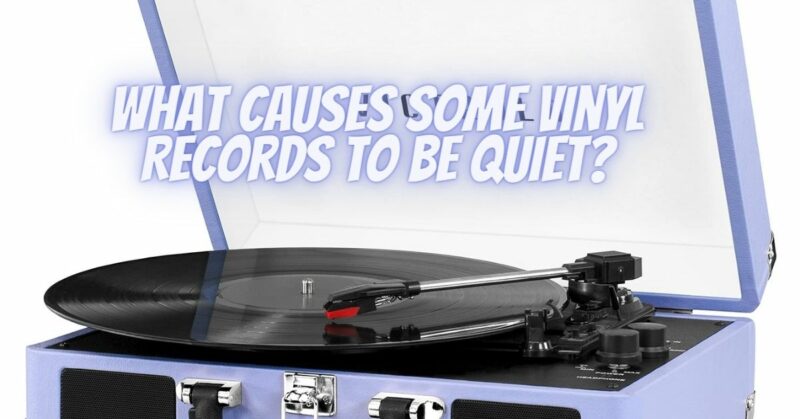Vinyl records are celebrated for their analog warmth and unique sound quality, but occasionally, listeners encounter a vinyl record that seems unusually quiet. This phenomenon can be frustrating, especially when expecting a dynamic listening experience. In this article, we will explore the common reasons why some vinyl records may sound quiet and what can be done to address this issue.
- Vinyl Pressing Quality
Vinyl records are manufactured through a complex process that involves creating a stamper from a master lacquer and pressing vinyl pellets into grooves. The quality of this pressing process can vary, leading to differences in sound output. Poorly pressed records may have shallow grooves or other defects that result in reduced volume and audio fidelity.
Solution: Unfortunately, there is little that can be done to improve the volume of a poorly pressed record. In such cases, the best course of action is to seek a replacement or refund from the retailer or record label.
- Vinyl Thickness and Weight
The thickness and weight of a vinyl record can impact its overall volume. Thinner or lightweight records may produce a quieter sound compared to thicker, heavyweight counterparts. However, thickness alone is not the sole determinant of volume.
Solution: If you prefer a louder listening experience, consider investing in thicker vinyl records (180-gram or heavier). These records often provide improved sound quality and a more substantial audio output.
- Recording and Mastering Choices
The original recording and mastering of the music can influence the volume of a vinyl record. Some albums are intentionally mastered with a quieter sound to preserve dynamic range and prevent distortion, particularly for genres like classical music and jazz.
Solution: In this case, the issue is a deliberate artistic choice rather than a defect. Listeners who prefer a louder experience can adjust their playback equipment’s volume accordingly.
- Turntable Setup and Calibration
The performance of a vinyl record is significantly affected by the quality and calibration of the turntable and associated equipment. If your turntable setup is not properly calibrated or if the cartridge is not aligned correctly, it can result in lower volume levels.
Solution: Ensure that your turntable is set up correctly, the cartridge is aligned, and the tracking force is properly adjusted. Regular maintenance of your turntable can also help maintain optimal performance.
- Worn or Dirty Records
Vinyl records can accumulate dust, dirt, and debris over time. This buildup can affect the playback quality and lead to quieter sound. Additionally, records that are heavily worn or scratched may produce lower volume due to damaged grooves.
Solution: Regularly clean your vinyl records using a carbon fiber brush, antistatic brush, or a dedicated record cleaning machine. For heavily worn or scratched records, professional cleaning and restoration services may be necessary.
Conclusion
While vinyl records are celebrated for their unique sound quality, it’s essential to understand that various factors can influence their volume levels. These factors range from the manufacturing quality of the record to the choices made during recording and mastering. By carefully examining these factors and taking appropriate measures, listeners can enhance their vinyl experience and enjoy the full potential of their record collections.

